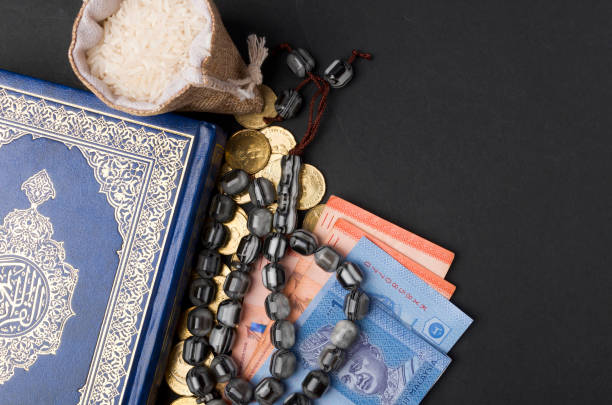
Zakat, one of the five pillars of Islam, plays a crucial role in shaping the social life of Muslim communities around the world. It is not only a form of worship but also a powerful tool for economic redistribution, promoting social justice, and fostering solidarity among Muslims. In this article, we will explore the profound impact of Zakat on the social structure, welfare, and cohesion of Muslim societies.
What is Zakat?
Zakat is an obligatory form of almsgiving in Islam. Every adult Muslim who meets the minimum financial threshold, known as nisab, is required to donate a portion of their wealth, typically 2.5%, to those in need. This financial contribution is aimed at purifying one’s wealth and supporting the underprivileged. Unlike charity, which is voluntary, Zakat is a compulsory act of faith, creating a sense of responsibility and duty among Muslims towards their less fortunate brothers and sisters.
1. Wealth Distribution and Poverty Alleviation
One of the most significant impacts of Zakat on Muslim society is its role in wealth redistribution. By mandating the wealthy to give a portion of their wealth to the poor, Zakat works as a mechanism to reduce inequality. It ensures that the basic needs of the poor and marginalized are met, thus alleviating poverty.
The Prophet Muhammad (S.A.W) emphasized the importance of wealth distribution, saying:
“The example of the one who gives charity and the one who does not give is like that of two people wearing armor. When the one who gives charity tightens his armor, it becomes tighter and closer to his body. And when the one who does not give charity tries to tighten his armor, it remains loose and offers no protection.” (Sahih al-Bukhari)
This hadith illustrates that giving Zakat brings about benefits, not only for the recipients but for the giver as well, as it purifies and protects the wealth and soul.

2. Social Solidarity and Community Cohesion
Zakat creates a sense of collective responsibility in Muslim communities. It encourages Muslims to care for each other and to help those in need. This fosters a strong sense of social solidarity, where individuals feel a deep connection to one another, regardless of their economic status.
The Prophet Muhammad (S.A.W) said:
“None of you [truly] believes until he wishes for his brother what he wishes for himself.” (Sahih al-Bukhari)
This teaching highlights the essence of empathy and mutual care in the community, which Zakat fosters by compelling Muslims to share their wealth with others. It reinforces the belief that the welfare of others is directly tied to one’s own faith.
3. Strengthening the Social Fabric
Zakat serves to strengthen the social fabric of Muslim societies by reinforcing the values of justice, compassion, and equality. It reminds society that wealth is a blessing and that the wealthy have a moral obligation to use their resources to uplift those less fortunate.
The Prophet Muhammad (S.A.W) said:
“Whoever relieves a believer’s distress of the distressful aspects of this world, Allah will rescue him from a difficulty of the Day of Judgment.” (Sahih Muslim)
This hadith emphasizes the significance of relieving the suffering of others through actions like giving Zakat, which not only helps those in need but also brings spiritual rewards for the giver.
4. Empowering the Marginalized
Through the distribution of Zakat, many marginalized groups, such as orphans, widows, the elderly, and the disabled, receive the support they need to live dignified lives. By ensuring that no one is left behind, Zakat empowers these groups and enables them to participate more fully in society.
The Prophet Muhammad (S.A.W) placed a strong emphasis on caring for the vulnerable members of society. He said:
“I and the one who looks after an orphan will be in Paradise like this”—and he raised his two fingers, indicating the closeness.” (Sahih al-Bukhari)
By prioritizing the needs of orphans and vulnerable individuals, Zakat is a means of empowering these groups and ensuring that they are not marginalized or excluded from society.
5. Promotion of Social Justice
Zakat is an essential tool in promoting social justice within Islamic societies. It encourages wealth redistribution in a way that is systematic, fair, and in line with Islamic principles of equality and justice. By ensuring that the wealthiest individuals contribute a fair share of their earnings, Zakat helps to address systemic inequalities and promote fairness in society.
The Prophet Muhammad (S.A.W) said:
“The most beloved of people to Allah are those who are most beneficial to others.” (Daraqutni)
This statement emphasizes the moral value of giving to those in need, thereby promoting a just and fair society.

The Psychological Impact of Zakat
Zakat not only benefits the recipients but also has profound psychological benefits for the giver. By paying Zakat, a Muslim purifies their wealth and soul, seeking closeness to Allah. This act of giving fosters a sense of inner peace and fulfillment, as it aligns the individual’s financial practices with their faith.
Moreover, regular Zakat donations encourage the giver to be more mindful of their consumption and wealth, cultivating a sense of gratitude and contentment. This psychological transformation helps individuals live a more balanced and spiritually fulfilling life.
The Long-Term Effects of Zakat on Muslim Societies
Over time, the impact of Zakat can lead to the creation of a more harmonious and just society. As Zakat is a continuous and regular obligation, it ensures that the redistribution of wealth is not a one-off event but a constant process that sustains social welfare. This helps to address long-term issues such as systemic poverty and inequality.
Moreover, Zakat can serve as a foundation for other forms of charitable work within Muslim communities, encouraging collective efforts to address various social issues like education, healthcare, and environmental protection.
Conclusion
Zakat has a transformative impact on the social life of Muslim societies. By redistributing wealth, fostering empathy, promoting social justice, and empowering marginalized communities, Zakat helps create a more equitable, compassionate, and cohesive society. It strengthens the bond between individuals, families, and communities, ensuring that no one is left behind in the pursuit of social and economic prosperity. As a key pillar of Islam, Zakat reminds Muslims of their duty to care for others and build a better world, both in this life and the hereafter.
The teachings of the Prophet Muhammad (S.A.W) further underline the spiritual and social importance of Zakat. Through his sayings, we learn that the act of giving is not only a financial transaction but a means of purifying the soul, strengthening the community, and promoting justice and compassion.
By understanding the profound social impact of Zakat, we can see how this act of charity goes beyond material giving. It is a spiritual, moral, and social practice that strengthens the very fabric of society and reflects the core values of Islam: justice, compassion, and equality.

